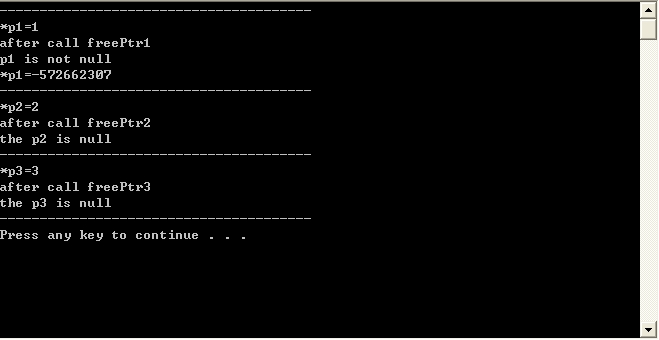c++中指针,指针的引用,指针的指针的区别
看例子和结果:
 #include "stdafx.h"
#include "stdafx.h"
 #include <iostream>
#include <iostream>
 using namespace std;
using namespace std;
 void FreePtr1(int* ptr1)
void FreePtr1(int* ptr1)
 {
{
 delete ptr1;
delete ptr1;
 ptr1 = NULL;
ptr1 = NULL;
 }
}

 void FreePtr2(int*& ptr2)
void FreePtr2(int*& ptr2)
 {
{
 delete ptr2;
delete ptr2;
 ptr2 = NULL;
ptr2 = NULL;
 }
}
 void FreePtr3(int **ptr3)
void FreePtr3(int **ptr3)
 {
{
 delete *ptr3;
delete *ptr3;
 *ptr3 = NULL;
*ptr3 = NULL;
 }
}

 void main()
void main()
 {
{
 cout<<"---------------------------------------"<<endl;
cout<<"---------------------------------------"<<endl;
 int *p1 = new int;
int *p1 = new int;
 *p1 = 1;
*p1 = 1;
 cout<<"*p1="<<*p1<<endl;
cout<<"*p1="<<*p1<<endl;
 FreePtr1(p1);
FreePtr1(p1);
 cout<<"after call freePtr1"<<endl;
cout<<"after call freePtr1"<<endl;
 if(p1 != NULL)
if(p1 != NULL)
 {
{
 cout<<"p1 is not null"<<endl;
cout<<"p1 is not null"<<endl;
 cout<<"*p1="<<(*p1)<<endl;
cout<<"*p1="<<(*p1)<<endl;
 }
}
 cout<<"---------------------------------------"<<endl;
cout<<"---------------------------------------"<<endl;
 int *p2 = new int;
int *p2 = new int;
 *p2 = 2;
*p2 = 2;
 cout<<"*p2="<<*p2<<endl;
cout<<"*p2="<<*p2<<endl;
 FreePtr2(p2);
FreePtr2(p2);
 cout<<"after call freePtr2"<<endl;
cout<<"after call freePtr2"<<endl;
 if(p2 != NULL)
if(p2 != NULL)
 {
{
 cout<<"*p2="<<*p2<<endl;
cout<<"*p2="<<*p2<<endl;
 }
}
 else
else
 {
{
 cout<<"the p2 is null"<<endl;
cout<<"the p2 is null"<<endl;
 }
}
 cout<<"---------------------------------------"<<endl;
cout<<"---------------------------------------"<<endl;
 int *p3 ;
int *p3 ;
 p3 = new int(3);
p3 = new int(3);
 cout<<"*p3="<<*p3<<endl;
cout<<"*p3="<<*p3<<endl;
 FreePtr3(&p3);
FreePtr3(&p3);
 cout<<"after call freePtr3"<<endl;
cout<<"after call freePtr3"<<endl;
 if(p3 != NULL)
if(p3 != NULL)
 {
{
 cout<<"*p3="<<*p3<<endl;
cout<<"*p3="<<*p3<<endl;
 }
}
 else
else
 {
{
 cout<<"the p3 is null"<<endl;
cout<<"the p3 is null"<<endl;
 }
}
 cout<<"---------------------------------------"<<endl;
cout<<"---------------------------------------"<<endl;
 system("pause");
system("pause");

 }
}
结果:

comments:
对p1指针:
cout<<"---------------------------------------"<<endl;
int *p1 = new int;
*p1 = 1;
cout<<"*p1="<<*p1<<endl;

// FreePtr1(p1);
void FreePtr1(int* ptr1)
{

delete ptr1;

ptr1 = NULL;

}

cout<<"after call freePtr1"<<endl;
if(p1 != NULL)
{
cout<<"p1 is not null"<<endl;
cout<<"*p1="<<(*p1)<<endl;
}
cout<<"---------------------------------------"<<endl;
而p2为:
调用前:

调用后:

注意:函数的参数进行值拷贝,即使传的是指针,也的对指针(即指针里存的地址)的拷贝, 可不是指针里地址所指的值的拷贝啊!
 #include "stdafx.h"
#include "stdafx.h" #include <iostream>
#include <iostream> using namespace std;
using namespace std; void FreePtr1(int* ptr1)
void FreePtr1(int* ptr1) {
{ delete ptr1;
delete ptr1;  ptr1 = NULL;
ptr1 = NULL; }
}
 void FreePtr2(int*& ptr2)
void FreePtr2(int*& ptr2) {
{ delete ptr2;
delete ptr2;  ptr2 = NULL;
ptr2 = NULL; }
}  void FreePtr3(int **ptr3)
void FreePtr3(int **ptr3) {
{ delete *ptr3;
delete *ptr3; *ptr3 = NULL;
*ptr3 = NULL; }
}
 void main()
void main() {
{ cout<<"---------------------------------------"<<endl;
cout<<"---------------------------------------"<<endl; int *p1 = new int;
int *p1 = new int; *p1 = 1;
*p1 = 1; cout<<"*p1="<<*p1<<endl;
cout<<"*p1="<<*p1<<endl; FreePtr1(p1);
FreePtr1(p1); cout<<"after call freePtr1"<<endl;
cout<<"after call freePtr1"<<endl; if(p1 != NULL)
if(p1 != NULL) {
{ cout<<"p1 is not null"<<endl;
cout<<"p1 is not null"<<endl; cout<<"*p1="<<(*p1)<<endl;
cout<<"*p1="<<(*p1)<<endl; }
} cout<<"---------------------------------------"<<endl;
cout<<"---------------------------------------"<<endl; int *p2 = new int;
int *p2 = new int; *p2 = 2;
*p2 = 2; cout<<"*p2="<<*p2<<endl;
cout<<"*p2="<<*p2<<endl; FreePtr2(p2);
FreePtr2(p2); cout<<"after call freePtr2"<<endl;
cout<<"after call freePtr2"<<endl; if(p2 != NULL)
if(p2 != NULL) {
{  cout<<"*p2="<<*p2<<endl;
cout<<"*p2="<<*p2<<endl; }
} else
else {
{ cout<<"the p2 is null"<<endl;
cout<<"the p2 is null"<<endl; }
} cout<<"---------------------------------------"<<endl;
cout<<"---------------------------------------"<<endl; int *p3 ;
int *p3 ; p3 = new int(3);
p3 = new int(3); cout<<"*p3="<<*p3<<endl;
cout<<"*p3="<<*p3<<endl; FreePtr3(&p3);
FreePtr3(&p3); cout<<"after call freePtr3"<<endl;
cout<<"after call freePtr3"<<endl; if(p3 != NULL)
if(p3 != NULL) {
{  cout<<"*p3="<<*p3<<endl;
cout<<"*p3="<<*p3<<endl; }
} else
else {
{ cout<<"the p3 is null"<<endl;
cout<<"the p3 is null"<<endl; }
} cout<<"---------------------------------------"<<endl;
cout<<"---------------------------------------"<<endl; system("pause");
system("pause");
 }
}结果:

comments:
对p1指针:
cout<<"---------------------------------------"<<endl;
int *p1 = new int;
*p1 = 1;
cout<<"*p1="<<*p1<<endl;

// FreePtr1(p1);
void FreePtr1(int* ptr1)
{

delete ptr1;

ptr1 = NULL;

}

cout<<"after call freePtr1"<<endl;
if(p1 != NULL)
{
cout<<"p1 is not null"<<endl;
cout<<"*p1="<<(*p1)<<endl;
}
cout<<"---------------------------------------"<<endl;
而p2为:
调用前:

调用后:

注意:函数的参数进行值拷贝,即使传的是指针,也的对指针(即指针里存的地址)的拷贝, 可不是指针里地址所指的值的拷贝啊!


